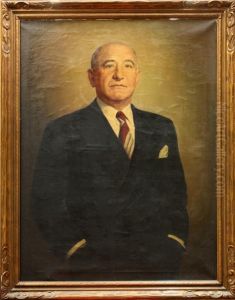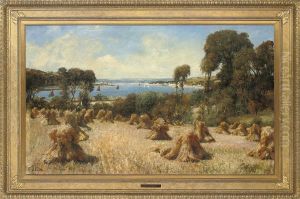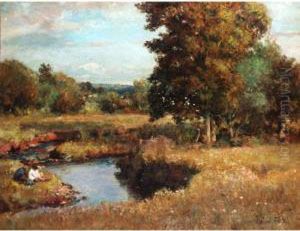Charles James Fox Paintings
Charles James Fox was a prominent British Whig statesman whose parliamentary career spanned 38 years of the late 18th and early 19th centuries and who was the arch-rival of William Pitt the Younger. His father Henry Fox, 1st Baron Holland, was a member of the old Whig nobility, ensuring that Fox was bred for politics from an early age. Born on January 24, 1749, Fox was educated at Eton and Oxford, where he developed a reputation for debauchery that would follow him throughout his life.
Despite his dissolute early years, Fox entered the House of Commons in 1768, and quickly made a name for himself as a brilliant orator. He initially held conservative views, serving as a junior minister in Lord North's government. However, his political stance evolved, and he came to champion the cause of parliamentary reform and the rights of the American colonists. This put him at odds with the government, and he resigned from his post in 1774. His support for the American Revolution and his opposition to the slave trade became defining features of his political career.
Fox's leadership of the Whig opposition during the American Revolutionary War was marked by his eloquence and relentless critique of the government's policy. After the war, he sought to reform the electoral system, which he saw as corrupt and unrepresentative. He advocated for the abolition of the slave trade, a stance that was far from universal at the time. Throughout his career, Fox was known for his quick wit, sharp tongue, and a propensity for gambling and high living, which contributed to his considerable debts.
In 1782, he served briefly as Foreign Secretary, but his tenure was cut short due to political infighting. He returned to the post in the coalition government with Lord North in 1783, but this too was short-lived, as King George III engineered its dismissal. Fox spent much of the following two decades in opposition, though he was instrumental in passing the Libel Act of 1792, which laid the foundations for modern British press freedom.
One of Fox's most significant political achievements came late in his life when he became Foreign Secretary again in 1806, in the Ministry of All the Talents, following Pitt's death. He immediately set about trying to end the British involvement in the transatlantic slave trade and succeeded in passing the Slave Trade Act of 1806, which made it illegal to trade slaves within the British colonies.
Charles James Fox died on September 13, 1806, before he could see the full implementation of his anti-slave trade policies, which would come with the Slave Trade Act of 1807. His legacy is that of a passionate advocate for liberty and reform, and a politician who remained controversial in his time for his radical views and personal lifestyle.

































